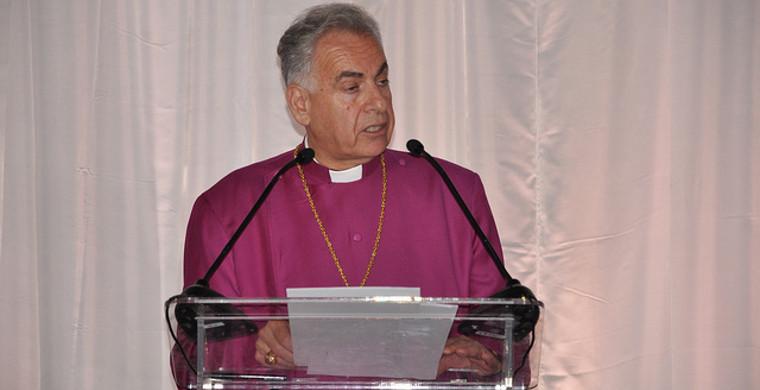Primates elected for the Episcopal Church in Jerusalem and the Middle East
Vicar-General for Iran appointed
By David W. Virtue DD
www.virtueonline.org
May 23, 2017
Archbishop Suheil Dawani of the Diocese of Jerusalem has been elected as the next Primate of the Province of Jerusalem and the Middle East. He succeeds Archbishop Mouneer Hanna Anis, who has held the post since 2007. Archbishop Dawani will serve for a period of two and a half years, to be followed by Bishop Michael Lewis of the Diocese of Cyprus and the Gulf. He will serve for the same length of time, ending in May 2022. The Synod of the Province of Jerusalem and the Middle East which met in Amman, Jordan on May 16-17, 2017.
Dawani is no friend of GAFCON and is not one of the (orthodox) Global South Primates. The Diocese of Jerusalem is firmly in the pocket of The Episcopal Church that has poured hundreds of thousands of dollars over the years into the diocese to keep it firmly in its camp.
This was most noticeable at the first GAFCON conference that met in Jerusalem in June 2008, which produced the Jerusalem Statement. To make sure Dawani did not meet with any GAFCON primate, Colorado Episcopal Bishop Rob O'Neill was sent by the Presiding Bishop to keep the Bishop of Jerusalem out of the conference and to keep his feet to the fire of TEC's largess. He was successful.
The current changes were decided upon at a two-day meeting of the Synod of the Province of Jerusalem and the Middle East, in Amman, Jordan. In a statement, the Synod said.
A new Vicar-General for Iran was also appointed. The Synod appointed The Rev. Dr. Albert Walters as the Vicar General for the Diocese of Iran for a six -month period.
The Synod also elected Mrs. Georgia Katsantonis as the Provincial Secretary and Mr. Ehab Edward as the Provincial Treasurer.
TEC AND DAWANI
In July 2015, TEC'S General Convention in Salt Lake City threw the Anglican bishop under the bus when they refused to take a stand for peace in the Middle East, deviating from their prophetic mission for peace and justice by refusing to stand with the oppressed Palestinian people.
In their efforts to justify why they wouldn't begin discussing the potential for future divestment from Israel, they badly hurt the reputation and image of the Anglican bishop of Jerusalem and essentially turned down a chance to stand up for peace in the Middle East.
The Episcopal Church's committee on Corporate Social Responsibility (CSR) was asked to develop a list of U.S. and foreign corporations that provide goods and services that support the Israeli occupation's infrastructure. According to a report in the Episcopal News Service, the goal of Resolution D016 was to "to monitor its investments and apply its CSR policy to any possible future investments" in such companies.
The resolution didn't even use the word "divestment," let alone "boycott" or "sanctions," the other two elements of BDS -- the popular movement to apply those tactics against Israeli economic interests until Israel changes its conduct toward Palestinians in the occupied territories -- which are anathema in pro-Israel circles.
Instead of discussing the merits of the resolution or listening to what their parishes said, the Episcopal bishops looked for a weak link. Citing conversations with the Anglican bishop of Jerusalem, the Rev. Suheil Dawani, the American bishops justified rejecting the resolution in order to protect their leader from political backlash.
END














